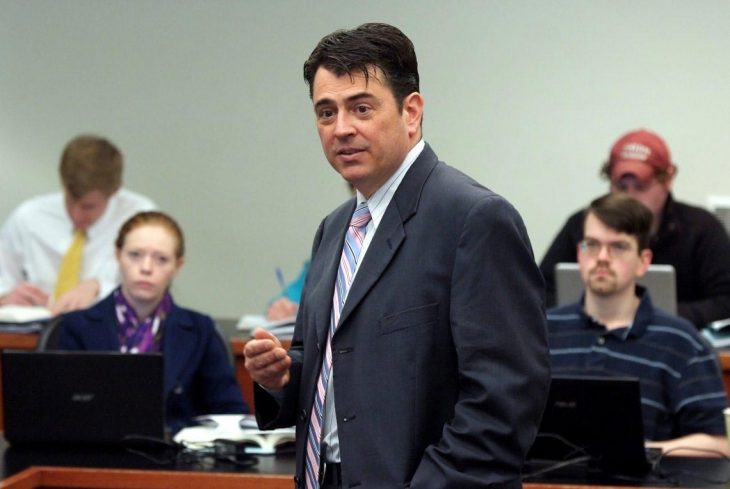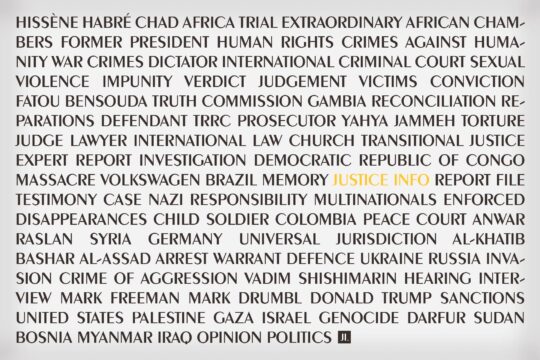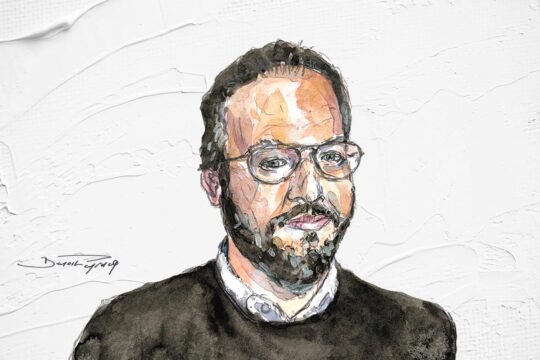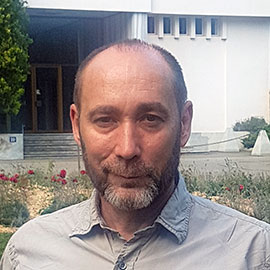SPECIAL WORLD DAY OF INTERNATIONAL JUSTICE (1/4)
JUSTICEINFO.NET IN-DEPTH INTERVIEWS
Mark Drumbl
Professor of Law and Director of the Transnational Law Institute at Washington and Lee University
For twenty years, scholar Mark Drumbl has written extensively on the subject. In his eloquent style he offers thought-provoking perspectives on the state of international justice, from the International Criminal Court to climate change to reparations and corporate responsibility.
The question that we should really be asking is: what kind of utility can the ICC serve when it is abundantly clear that today it will never be able to achieve the goals that were initially placed on its shoulders?
JUSTICEINFO.NET: How do you make a clear diagnosis of the widely talked about crisis of international criminal justice? Or as the pop band Supertramp said: “Crisis? What crisis?”
MARK DRUMBL: The crisis is on multiple levels. But the most fundamental, unresolved issue to me, the most poignant and the most powerful, is this reality – captured in another Supertramp song – of “I’ve been living next to you, my friend, but what kind of a friend are you?”, people actually going out and collectively killing their neighbors. This is one point we haven’t fully managed to unfurl.
The term “crisis” is just rabidly overused to describe almost anything that doesn’t go according to expectations. There is a melodrama to the invocation of this kind of terminology. Melodrama is appealing; it repels and draws in at the same time. But the term is overwrought to the point that it’s almost become banal. Everything is in crisis, always – it’s a perpetual crisis.
The ancient Greek root of the word “crisis” actually means election, decision, a point of inclination, of movement. This is the best way to capture what I think has happened. As you know, the International Criminal Court (ICC) emerged in a moment of peculiar, liberal, institutional internationalism in the 1990s. We, transnationalists, have decided that building a number of criminal courts is the best way to achieve justice. Now if we created something that was intended to achieve a certain goal and has stood for this symbolic value of an era of international liberalism and legalism, and that this is increasingly fading, are we better off not having married in the first place or are we better off getting divorced? I think we’re better off getting divorced.
For all and each of us committed to accountability, equality, dignity, justice, and repair – for all of us committed to redressing grievous human rights abuses of the past and deterring for the future – I believe the time has come to have real conversations that may feel dislocating and unsettling. The question that we should really be asking is not whether the ICC can be saved according to the initial expectations that created it. It is instead: what kind of utility can it serve when it is abundantly clear that today it will never be able to achieve the goals that were initially placed on its shoulders? I think we need to relieve the ICC of its cross.
Perhaps political justice is not just so bad. And perhaps better levels of honesty and contrition could at least avoid what I see as the spectacularisation of constant disappointment.
And what is the ICC cross?
The one thing that the ICC has done well so far is to prosecute a handful of rebel leaders, generally at the mid-level, in jurisdictions whose governments have cooperated with the court and to whom the court has turned a bit of a blind eye with regards to human rights abuses. After 20 years of operation this is the one thing the ICC has succeeded in doing in a handful of cases – so why not just own that? Why does the court not just say: that is the business that the court is involved in. Point final. And say, look: a political, partial justice is really not so bad, maybe that’s better than no justice at all.
Another thing the court has done is that it has generated levels of new jurisprudence on child soldiers, on pillage, on attacks on cultural property. So perhaps the court can say: what I can realistically do is generate new law in the pursuit of the losers.
Look at any institution over its lifespan: maybe the period at the start is not the period that necessarily works. Look at the whole Afghanistan thing [last April, ICC judges decided not to allow an investigation in Afghanistan that would notably target U.S. servicemen]. Yes, I guess the court could have been some kind of David trying to hit Goliath with a pebble between the eyes. But the ICC can’t shoot straight, so that’s not going to happen. So why all this disappointment about the fact that one of the global hegemons decided that it wasn’t going to support being investigated by an international institution? And how is it so different than Kagame in Rwanda? So perhaps political justice is not just so bad. And perhaps better levels of honesty and contrition could at least avoid what I see as the spectacularisation of constant disappointment.
What if the institution had its value for some time but that we don’t need it any more?
That’s one way to look at it. But we have created the ICC, and for it to become extinct, that bothers me. That makes me sad. I would rather have reinvention, repackaging, even just some level of narrow obsolescence than extinction. In extinction, there is a loss, and I worry about that.
In the next decade or two young people are going to become active in a different set of global security challenges and the ICC can also be repurposed along those lines
Who would be in the best position to reimagine the ICC at this point?
I think the only way would be either through funders of the institution or the not-for-profit community. The global civil society has been blowing a lot of hot air into the ICC. That could be one starting point by which to begin to repurpose, reimagine the ICC.
Another pressure point is that in the next decade or two young people are going to become active in a different set of global security challenges and that the ICC can also be repurposed along those lines, to help re-caliber the kind of threats that we face. There is another opportunity here.
In the 1990s there was this sense of enormous potential of liberal, institutional internationalism. But as more time passes, I think that period was an aberration and not the start of a trend. It was a blip, not a bounce. I think the times we are in now are actually more reflective of most of the periods of time that humanity has been in. Just because Kambanda and Milosevic were prosecuted doesn’t mean that some permanent, global institution invested in all these situations is going to do the same. I think we’re prisoners of our own period. What we see as crisis, others see as irrelevance or normal.
At a recent conference in Amsterdam, you said: “Maybe I am going to teach differently; maybe I am going to teach more of the Gambia and less of the ICC.” Is the future domestic, as it is now common to say, and is it something to celebrate?
I think this ties on to a broader generational thing as well. Folks in the 1990s saw the future as internationalized and had a deep skepticism of the “municipal”, in public international law language – what everyone else would call the domestic. And just as there has been a turn in politics to a form of nationalism and nativism, perhaps one way for the ICC to rebrand itself is not only to drop this excessive altitude in its ambitions but also to help at the national level. And if that needs a more political form of justice, then so be it.
To me that’s the hang-up that has to been given up. There is this idea that in order for an institution to be legitimate it has to be born within a space of moral perfection and beauty, like an immaculate conception. There is this whole aura around international courts that they have to be impartial, even-handed, free of the ditch of politics in order to be effective. And what I am saying is that you can have a dirty conception and still achieve some good.
International justice day should be an embrace of imperfection rather than some kind of fetishisation of purism.
And this reality is better accepted at the domestic level?
Correct. That’s also a mindset. What we are seeing today with the ICC is not just something that can be corrected with new people or higher levels of competence or more funding. I think it’s the limit of purism in the pursuit of justice. And we need to own that.
Ironically, national decision makers are more adept at having that dance with the devil than internationalists are. So at the end of the day this is a major undoing. What we should celebrate on international justice day is alchemy, processes that are not perfect. International justice day should be an embrace of imperfection rather than some kind of fetishisation of purism. Maybe that would be something worthy of celebration. Maybe that’s the new period.
The end of a religion?
Literally the end of a religion.
Let’s look at new trends. A new development has been the “IIIMs” – the International, Independent, Impartial Mechanisms. We can’t do courts anymore, so we do investigations. This way we can sidestep tribunals and the United Nations Security Council. Is this a positive development or a poor substitute to courts?
To some extent it’s a positive development because it suggests some recalibration and rethinking and a diversification of new actors. But on the other hand, it’s problematic and more of the same because it also reposes on this faith that law can solve all these problems. Another coupling that happened in the 1990s and that is part of purism is this unrequited faith in law.
The global civil society needs to begin to think about international criminal law without reporting or focusing so much on the international institutions.
You said we need to “unhook” the project of international criminal law from the institutions. Can you explain?
One overlap that has emerged is that the success of international criminal law is depended on the success of the ICC. For many years courses on international criminal law were courses on the ICC and the ad hoc tribunals. I think what we ought to be doing pedagogically is teaching classes about international criminal law with no reference to international institutions and see how that goes. Similarly the global civil society needs to begin to think about international criminal law without reporting or focusing so much on the international institutions. Once again, the ICC can contribute to that process by itself beginning to try and occupy less attention.
We’ve been doing international criminal law in many ways, shapes and forms for a very long time without even recognizing that it’s being done. That’s the other danger of an excessive idolatry and focus on the ICC: a lot of what that institution professes to do is, has been and will continue to be done in a myriad of places that no one really looks at. This focus on this one institution distracts from the fact that we’ve been doing this for a long time. And I really contest these narratives of birth. That’s why I don’t like this anniversary stuff so much. This thing that July 17, 1998, is where it began, or Nuremberg is where it began. No! What happened there is that it began to become a formalized discipline of study in which people were epistemically trained and acquired international criminal law as a professional vocation.
Climate change, global health pandemics, flows of global capital, these are acts in which everyone is slightly complicit and slightly victimized, that then become aggregated into collective security threats that the criminal law generally cannot respond to.
You also said that you are not convinced that the future lies in mens rea crimes [the mens rea is the mental element of a person’s intention to commit a crime, or this person’s knowledge; it is a necessary element of many crimes]. What do you mean by that?
I think the greatest collective challenges that we face are not crimes of intent, or conduct, or full expression of free will. It is small daily acts. Climate change, global health pandemics, flows of global capital, these are acts in which everyone is slightly complicit and slightly victimized, that then become aggregated into collective security threats that the criminal law generally cannot respond to.
The hydraulics of the criminal law always fully inflate the wrongdoing, the independence and the agency of the accused, and hyperinflate the vulnerability of the victim. So, we lose out on the fact that perhaps even in mens rea conduct the greatest reason it metastasizes is because of the involvement of ordinary people.
Looking ahead, the criminal law paradigm cannot fit something like climate change. Because the conduct at hand is not mens rea conduct. What are you going to do? Find mens rea conduct every time you get on an airplane and travel somewhere? As this particular challenge emerges, I think there will be even less of a role for law.
But the whole conversation on how to fight serious violations linked to climate change is to talk about ecocide, which is repeating a similar legal framework. Are we making the same mistake again?
At the end of the day criminal law can play a very limited role in that regard. One of the appeals of criminal law is that it is theatrical. It resonates. It can be sold to the public. It’s performance. What people interested in international justice succeeded in doing is to marketize the courtroom. What has emerged is a sense that if a problem is serious it needs a courtroom, and if a problem that is serious has a courtroom attached to it, it gets public attention. That leads to this focus of redefining issues and problems within the framework of criminal law when the criminal law may actually be quite inept in dealing with that.
Instead of thinking about the end of history we should begin to think about the end of immodest lawyering. Because I don’t think law can solve the biggest problems we face.
Do we still need to define ecocide or is it the wrong direction?
I can understand that there is a space to prosecute some military leaders who deliberately defoliate jungles to achieve some military advantage that is excessive with regards to the goals at hand. But that’s not the problem we face with climate change: it’s you and me and how we live our lives on a daily basis, and you can’t criminalize everybody on the planet. If we apply the criminal law paradigm to climate change then this is true mass incarceration!
We need to start thinking beyond. And instead of thinking about the end of history we should begin to think about the end of immodest lawyering. It would be a more healthy way to take law off of its pedestal. Because I don’t think law can solve the biggest problems we face.
That’s the challenge for the ICC. It has to look at itself in the mirror and say: I’m actually really not that attractive.
Indigenous populations are growingly at the center of some of the most cutting edge and daring justice moves like the National Inquiry in Canada or the fight for the environment in Brazil. How do you understand that?
One thing I find very interesting is the relationship indigenous populations have with Western law. It is often very fraught, skeptical, and in many instances problematic. So perhaps one of the reasons why there is great level of creativity and intrepidness coming out of conversations inspired by indigenous peoples is due to a view of the world that just departs from the “mainstream” view. Maybe that is what ought to be harnessed. But once again that means ceding control. And that’s the challenge for the ICC. It has been put on such a pedestal and it has to look at itself in the mirror and say: I’m actually really not that attractive; everyone has all this faith in my beauty but maybe I don’t look so good.
The thing I like about reparations is the greater honesty about it: It shows victims as agents of a neo-capital global order just like anyone else.
International NGOs and lawyers, governments and institutions that used to look down on reparations suddenly seem to care about it. Is it a meaningful evolution, or is it simply a symptom of the crisis of international criminal law?
One way to look at reparations and the role of the ICC in reparations is through the prism you suggest: a search for meaning. If we can’t do this, we’ll do that; if we can’t play baseball, we’ll play football.
I think there is one thing that I do like about the push towards reparations is that it actually portrays a more honest picture of what victims want. One of the pushes behind the criminal courtroom is the idea that victims will be satisfied symbolically when they see their oppressor in a prison cell: “I have been wronged and I will become whole when my oppressor is sitting in a prison cell.” It boxes victims themselves in this position of purism. The thing I like about reparations is the greater honesty about it: I want stuff, and I deserve this stuff. It shows victims as agents of a neo-capital global order just like anyone else, and I think this is quite refreshing.
I mean, prosecuting a handful of people in The Hague is really easy, because the vast majority of people are not touched. All their little bits and pieces of guilt, all their bits and pieces of being bystanders and sidestanders, all of that is overlooked, everything is placed on the shoulders of a handful of decidedly ugly perpetrators. Their punishment expiates the stain of involvement from the rest. Reparations offers a more vivid conversational space for responsibility and humanity. I like it when victims say: “I want stuff. I want my stuff back.” I think it’s very humanizing.
I find it very glib when global civil society talks about corporate responsibility when that same global civil society was so desperate to set up institutions and that the institutions they set up deliberately omitted corporate responsibility.
The role and responsibilities of corporations is another key growingly talked about topic. How do you look at it?
I find conversations about corporate responsibility for international crimes incredibly boring. Under existing international institutions, a conscious decision was made to exclude corporate responsibility. In our push and haste and rush to create the ICC we left stuff behind, and we left behind the idea of corporate responsibility. That is the fault of the people who created the ICC. I find it very glib when global civil society talks about corporate responsibility when that same global civil society was so desperate to set up institutions and that the institutions they set up deliberately omitted corporate responsibility. It is such a passive/aggressive conversation, to lament what you were complicit in omitting. That’s why I find it boring. I find it desperate.
The most interesting thing about international criminal law now is not what it says about itself, but how it can be deployed for other purposes and what it says about broader social questions as an entry point.
And you see nothing that is currently trying to change this?
I do. There are amazing thinkers and practitioners and scholars who are seeking to revitalize conversations about accountability for corporate actors. These voices are wonderful because they largely approach the topic innovatively. But that conversation is hamstrung by the very institutions we created. I don’t think we can get to a place where we speak about corporate responsibility for international wrongdoing unless we revisit the entire frame of the neoliberality of domestic corporate law in virtually every country in the world. That’s the starting point.
But I think the climate change conversation is going to eventually shatter that. It offers an incredible opportunity to rescale and revisit how we think about profits, progression, performance. Which is why we need to begin to shy away from our fixation that prosecuting hate-based mens rea violence is going to solve the riddles of global discord. It’s not. What is going to happen when we have all robot armies? What will happen when we have violence that is structured by entities that have no capacity for sadism, compassion or emotionality? Every second PhD thesis is about some arcane thing about the Rome Statute. The world does not need this anymore.
The most interesting thing about international criminal law now is not what it says about itself, but how it can be deployed for other purposes and what it says about broader social questions as an entry point. Maybe that’s another way for the ICC to reimagine itself: as a discursive entry point for a broader conversation: youth and violence, cultural property, how victims can victimize. Maybe that’s another reframing for the ICC: let’s be ok with that court not being an end in itself but for being a conduit for much a broader conversation.
Interviewed by Thierry Cruvellier.
 MARK DRUMBL
MARK DRUMBL
Mark A. Drumbl is the Class of 1975 Alumni Professor of Law at Washington and Lee University, where he also serves as Director of the Transnational Law Institute. He is the author of Atrocity, Punishment, and International Law (CUP, 2007) and Reimagining Child Soldiers in International Law and Policy (OUP, 2012) and is co-editor of the Research Handbook on Child Soldiers (Elgar, 2019).







